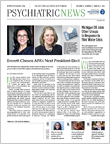A recent meta-analysis published in JAMA Psychiatry suggests that young people who take antipsychotics may be more likely to develop type 2 diabetes than those not taking the medications.
The findings, wrote author Christoph Correll, M.D., a professor of psychiatry and molecular medicine at Hofstra North Shore-LIJ School of Medicine, and colleagues, emphasize the importance of routine and proactive monitoring of cardiovascular risk factors when prescribing antipsychotics to youth.
“Antipsychotics have been used for psychosis, but also for many nonpsychotic conditions,” including impulsivity, mood dysregulation, aggressive behaviors, depression, and anxiety in youth, Correll told Psychiatric News.
He noted that although previous studies have shown a clear link between antipsychotic treatment and impaired glucose tolerance, insulin resistance, and type 2 diabetes in adults, far less is known about type 2 diabetes risk in children and adolescents taking the medications.
To examine whether there is a link between antipsychotic use and risk of type 2 diabetes in youth, Correll and colleagues analyzed data from 13 longitudinal studies that reported on incidence of the metabolic disorder in 185,105 youth aged 2 to 24 who were exposed to antipsychotics for at least three months.
The researchers found that the type 2 diabetes risk and incidence of type 2 diabetes, respectively, were 2.6-fold and 3.0-fold higher in antipsychotic-exposed youth compared with healthy controls and 2.1-fold and 1.8-fold higher compared with people with a psychiatric illness who were not taking an antipsychotic. A separate analysis of 10 of the studies revealed that type 2 diabetes risk was significantly greater in males compared with females, in youth treated with olanzapine, and in those exposed to antipsychotics over a longer period.
The researchers noted that although the risk for type 2 diabetes was significantly higher in antipsychotic-exposed youth than in psychiatric controls and healthy controls, “the number of actual excess cases was low” during the mean follow-up period of 1.7 years.
“Nevertheless,” they added, “the clinical importance of these findings is underscored by studies showing increased morbidity and mortality associated with an earlier [type 2 diabetes] onset.”
“Type 2 diabetes is a risk when treating youth with antipsychotics, especially long term,” Correll added. “Therefore, antipsychotics should be used judiciously and for as short a period as necessary and possible.”
The researchers are currently examining the mechanisms of antipsychotic-induced weight gain and diabetes, and alternative therapies for treating nonpsychotic conditions.
This research was funded by the National Institute of Mental Health. ■
An abstract of “Type 2 Diabetes Mellitus in Youth Exposed to Antipsychotics” can be accessed
here.

